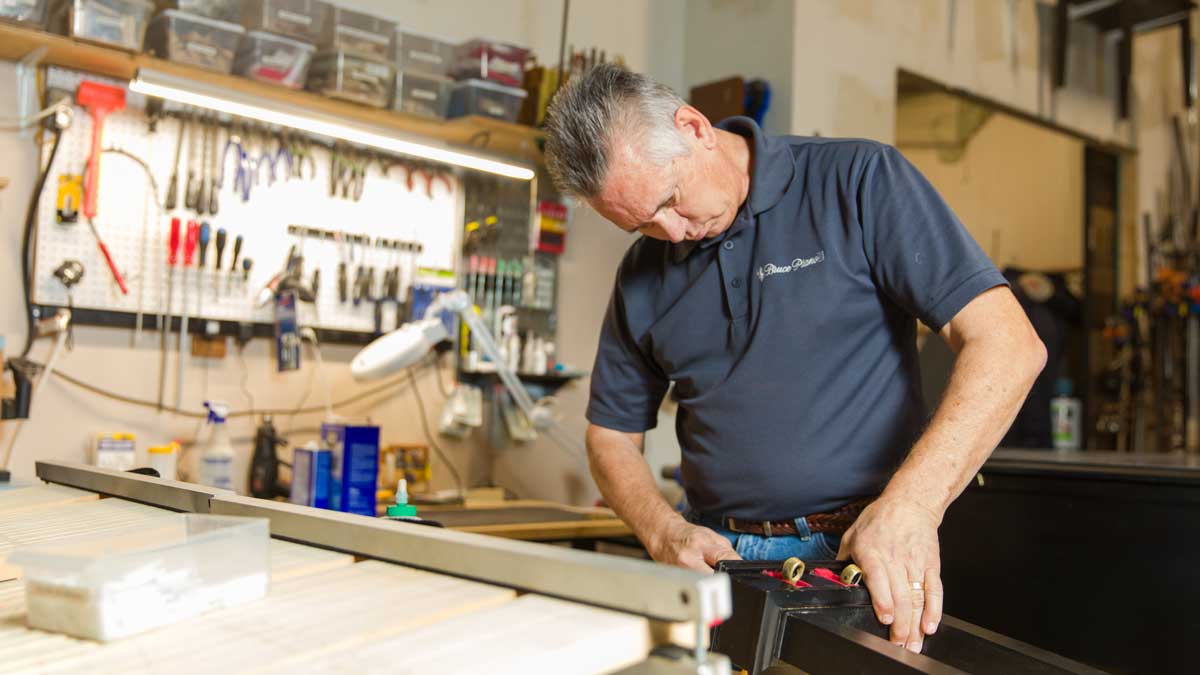By Phil Klutts
December 7, 2021
Local businesses overcome supply chain issues
The Port of Los Angeles is 1,300 miles away. The Suez Canal is even further from Edmond at almost 7,000 miles on the other side of the globe. These two places, along with factories and transportation hubs worldwide, have had an impact right here in Edmond. Supply chain disruptions have delayed or halted shipments coming to stores and companies near you.
Bruce Piano has been dealing with these holdups for almost four months.
“Normally, I can get a replacement in about four to six weeks, but it has been almost four months,” says owner Jordan Bruce. “I sold the two that I had in stock.”
Mason & Hamlin, the pianos that Bruce is waiting on, retail for $8,000-$15,000, depending on the model. Lost or delayed sales have an impact on any business.
“Christmas is usually a good time when people are looking to buy higher ticket items. I guess no new pianos for Christmas this year.” Bruce Piano has other items in stock, but it is frustrating to have no idea when new inventory will be available. He states that they have changed from saying that deliveries will be in a month or two to only saying, “TBD.”

For the most part, supply chain and logistics used to be a behind-the-scenes industry. The general public and many businesspeople thought about purchase and delivery but didn’t go much past where and when they would get their goods or materials. That all changed in 2020 and continued to intensify in 2021. These critical business functions have been in the news almost daily, and people everywhere are talking about them. These issues are widespread, unlike previous or “normal” supply chain disruptions. Supply chain professionals are used to overcoming obstacles, but it seems there is almost no way around them right now.
Some experts are predicting it will be mid-2023 before these disruptions are mitigated. It isn’t just one industry or geographic area; vehicles, consumer goods, electronics, medical supplies, raw materials, and many others are in short supply.
The Federal Reserve Bank of St. Louis’ website reports the inventory to sales ratio for automobiles is at a record low of 0.389 for October 2021.1 The automobile industry typically has a high amount of inventory. In simple terms, it means there simply aren’t enough cars for consumers to choose from. Semiconductor chip shortages, factory shutdowns, and transportation issues are all contributing to empty car lots.
Increases in demand have also contributed to these disruptions. New home sales, home renovations, and extra spending cash have compounded the effect of shortages and delays. The lumber and construction industry was hit hard due to non-essential industry shutdowns in early 2020 and import issues with goods coming from other countries. Lumber prices peaked in April of 2021 before falling to 2021 lows during the summer. Homebuilders and remodeling contractors have been in the thick of these issues.
Josh Moore, the owner of Moore Quality Homes, says he has never seen issues compound like this. “It started with lumber and was a pure supply and demand issue from the mills,” says Josh, also stating that now, it’s just about every item that has this issue.
Appliances have been a particularly troublesome product for Moore. He says that “Appliances or air conditioners may need just one little part that the manufacturer cannot get.” Moore’s clients will normally pick out appliances and order just two months before they are installed. “I just had my client decide on appliances right after the slab was poured.” That is an eight-month lead time until the appliances are needed to go in the home.
All these delays and limited supply increase costs for consumers and businesses. It is not always feasible or good business to pass those costs onto customers for Moore and other builders. Josh says, “It takes a partnership between the builder, sub-contractors, and customer to make it through these issues. You can’t just throw up your hands as a business owner. We have to jump in and find solutions,” says Moore.
He and other business leaders are doing just that, and Jordan Bruce is doing the same by focusing on preowned pianos and refurbishing pianos he can get in his shop.
1U.S. Bureau of Economic Analysis, Auto Inventory/Sales Ratio [AISRSA], retrieved from FRED, Federal Reserve Bank of St. Louis; https://fred.stlouisfed.org/series/AISRSA, December 2, 2021.
Subscribe to Email Updates
Subscribe
Get Edmond Business news in your inbox.

About Phil Klutts
Phil is an Edmond native and has managed to keep his wife here instead of traveling the world, which they both enjoy. They have two boys who love the outdoors, adventures, and learning new things. Phil is a problem-solver at heart and enjoys connecting people to the resources they need.
In addition to being the co-owner of Edmond Business, Phil founded the CK Group LLC after working for large and small businesses in the Energy, Construction, and Fitness industries. He focuses on helping small businesses and entrepreneurs improve their systems and processes. CK Group LLC's mission is to eliminate chaos and create clarity for small business by connecting vision, strategy, and implementation.



